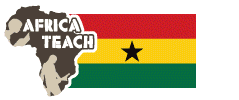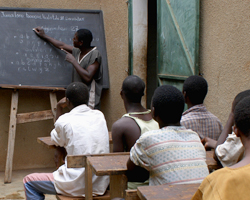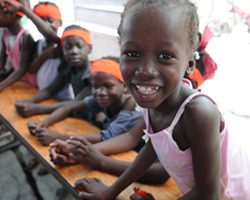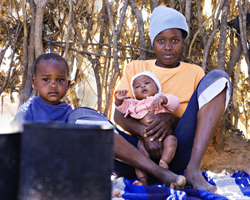Strategic Plan
The educational needs are so severe in Africa, that a new educational model had to be developed by mixing traditional academics with the arts, business, marketing, leadership, vocational training, and computer internet technology. Education at our community schools are totally, completely free to the students, their families, and the surrounding community. There are no supplementary expenses for books, uniforms, or supplies. Nutritious meals and basic medical services are also provided.
Our education model has three education centers in one:
At the core of our concept and with current education levels being low, one of the main priorities of our school will be to educate future teachers. This allows an initial investment to pay forward beyond the scope of the initial expenditure itself. It also opens the opportunity to franchise our school model exponentially in order to expedite the process of universal, quality education for all. With a network of educational facilities throughout the continent, social change will be greatly expedited, yet this change will come from the indigenous people of Africa instead of foreigners. This empowerment principle is a key difference in our approach.
The second part of our school's priorities is a superior, quality, traditional academic education with a few innovative approaches thrown in for good measure. Because we believe in the future of technology and that the computer and internet revolution is upon us and here to stay, we focus a large portion of our educational curriculum on a multi-discipline, integrated technology approach. Students are exposed to the global community and the global community, in turn, will be focused on the students of Africa. Students are encouraged to learn their lessons and share their ideas in multi-media digital formats through the use of computers, digital photography, video, and the world wide web. All of the basics of reading, writing, and arithmetic are learned and amplified through these new world media formats. Technology permeates all sectors of the world and in order to have a place in that world, students must become stakeholders in this technology. We are committed to helping them move into that arena with ease and confidence. Dovetailing with this media based education model, we integrate the principles and theories of business into the everyday life of our students. After all, let's be honest here; the ultimate goal of a quality education is to have consistent employment and a higher quality of life that comes along with the ability to financially support oneself and one's family. From the beginning of the first school year until the last day of school ending with graduation, Africa Teach is training our students to become entrepreneurs and skilled business people. The students not only receive the theory and principles of business, but also hands on practice running a business that directly benefits the community in which they live.
The third component of our school's model falls into the vocational, information, and referral areas which benefit the community surrounding the school. Not only does it take a community to raise a child, but it takes a community school to serve those people as they mentor those children around them. The skills being taught in the community are tailored specifically to the school's and the village's sustainability needs. Basics for standards of living such as health, nutrition, water purification, solar energy, solar cooking, food, security, sanitation, HIV/AIDS prevention, agriculture, first aid, CPR, basic medical practices, trades, and skills useful for earning a living are taught to the students' families and the local community. This concept is both philanthropic to the area's population and self-serving to the school entity itself. Whatever the school needs to do to be operational should be taught to the community at large. This creates numerous job opportunities, but these opportunities are far from simply a paycheck. They are all necessary elements of the school's operational and business models. Again, this level of empowerment is a key difference in our approach. A sense of community is historically important to Africa's people. Our model compliments that concept specifically.
|
|
|

 Since education is one of the weakest links in Africa's culture, Africa Teach has designed a new model of education to provide teacher training, quality academics and vocational training for students, and human services to the surrounding communities. The lack of education in Africa has created a cycle of health and environmental problems that cannot be easily changed without some level of intervention. Africa is not exclusively responsible for these problems, as some of the blame must be shared with the United States and the European nations that set-up colonies in the area. Unfortunately, Africa's people now seem to have exclusive liability for their situation, and they deserve and need our help.
Since education is one of the weakest links in Africa's culture, Africa Teach has designed a new model of education to provide teacher training, quality academics and vocational training for students, and human services to the surrounding communities. The lack of education in Africa has created a cycle of health and environmental problems that cannot be easily changed without some level of intervention. Africa is not exclusively responsible for these problems, as some of the blame must be shared with the United States and the European nations that set-up colonies in the area. Unfortunately, Africa's people now seem to have exclusive liability for their situation, and they deserve and need our help. 1. School for Training Teachers:
1. School for Training Teachers:  2. School for Academics, integrated with the Arts, Video, Computer Technology, and Business:
2. School for Academics, integrated with the Arts, Video, Computer Technology, and Business:  3. School for Community Education, Information, and Vocational Training:
3. School for Community Education, Information, and Vocational Training: